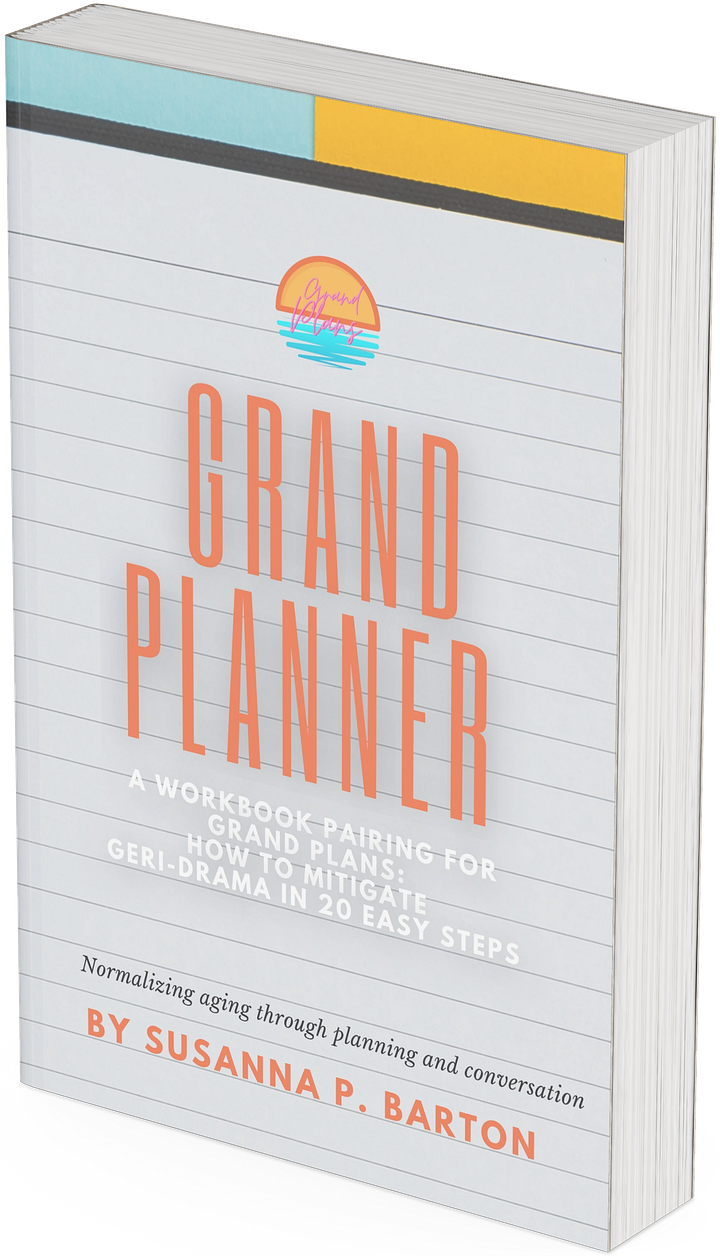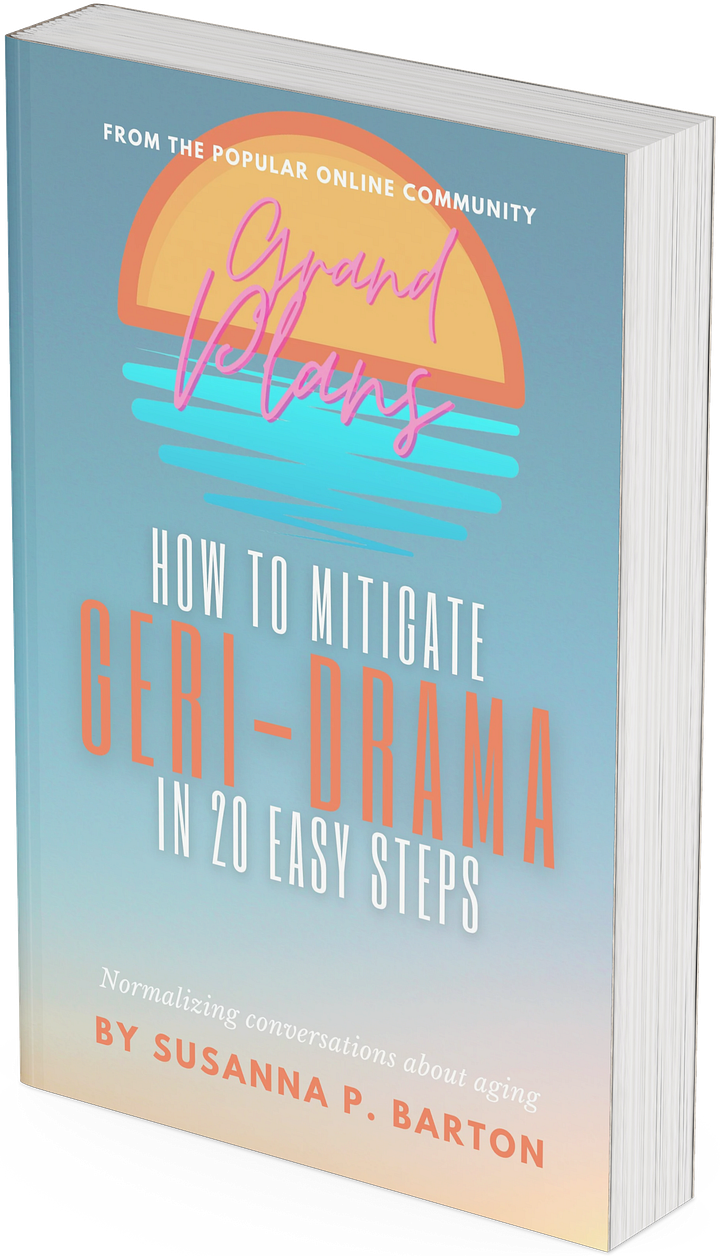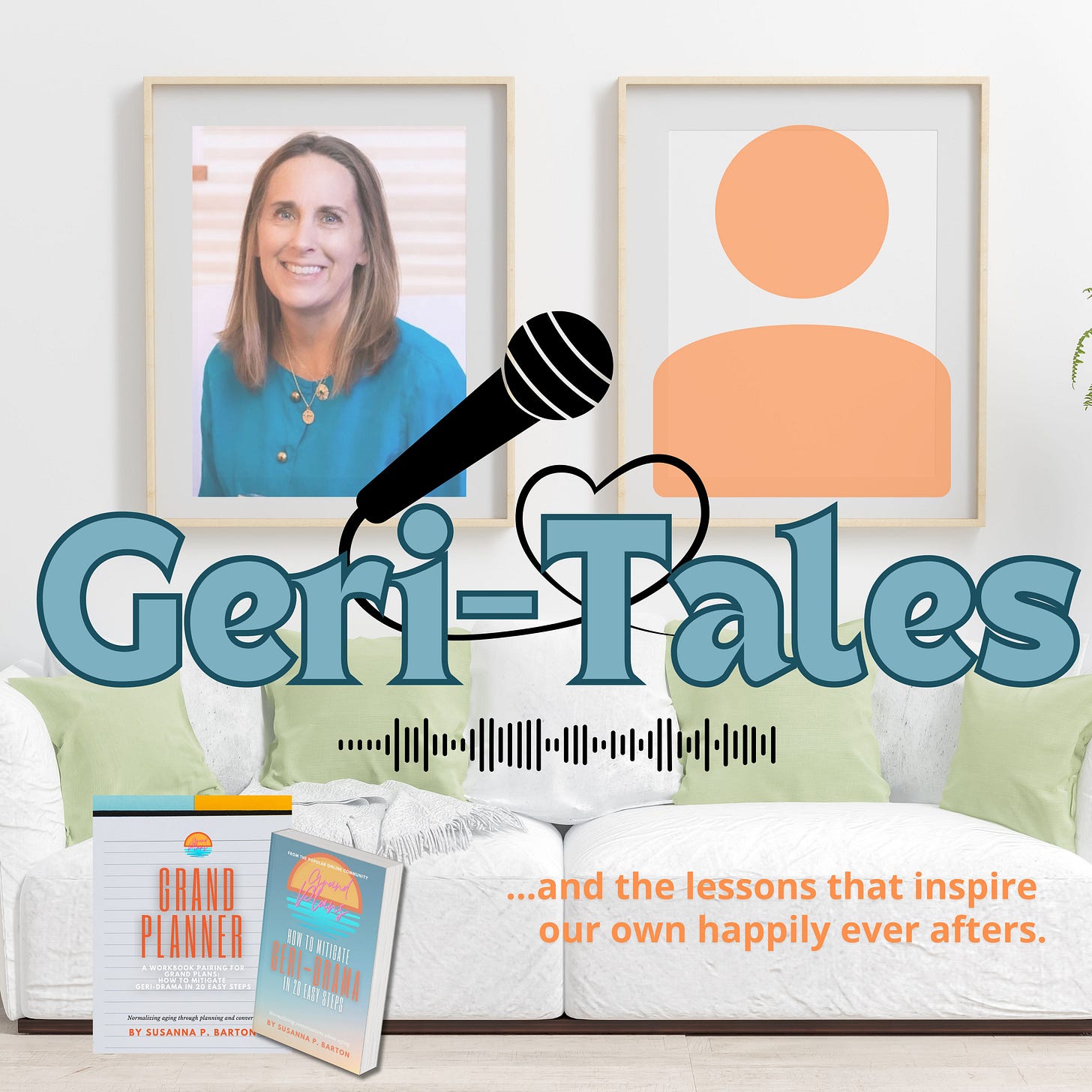Grand Plans: August 1, 2024
A semi-monthly newsletter from Grand Plans designed to normalize and celebrate our glorious geri-destiny through information, stories, real talk conversation, smart planning and shared experience.
Things I’m prattling on about today

Whether you are caring for a loved one remotely or mapping out ways to manage your own senior needs independently, being well-informed about the professional resources available to help you can reduce a significant amount of stress on yourself and others.
So, let’s talk about the seven senior service providers who can help be your all-hands-on-deck and simplify your self- or remote caregiving drama. Their support offers assurance that you don’t have to do it alone and that you never have to reinvent the wheel to come up with a workable Grand Plan!
When I was pulled into a surprise caregiving management fiasco of an elderly couple in South Florida several years ago, I utilized most but not all of these service providers listed below, and I will say up front that working with them is not an inexpensive proposition. BUT, their services can be worth every penny depending on the situation. In my case, I was called upon to muddle through this senior pair’s financial, legal, criminal and complicated medical and psychiatric knots — and I had absolutely zero experience, aptitude or training to even know where to begin. “Freaking out” does not even come close to describing my qualifications for the job. Though this work was still the most challenging misadventure I’ve had to date, the support from these experts helped me navigate a remote caregiving situation’s obstacles that otherwise would have derailed my will and capacity to assist.
So let’s look at the seven senior service providers that can help make caregiving management — for yourself or your loved ones — a lot less knotty.
Geriatric Care Manager, or Aging Life Care Expert
According to the Aging Life Care Association, a nonprofit association with more than 2,000 members around the country, aging life care management is “a holistic, client-centered approach to planning with and caring for aging adults, dependent adults, or others facing ongoing health or disability challenges. As experts in aging well, Aging Life Care Managers help older adults navigate the challenges of aging and make positive, informed decisions and plans. Their guidance leads people to the actions and decisions that ensure quality care and an optimal life for themselves or those they love, thus reducing worry, stress, and time off of work for family caregivers through assessment and monitoring, planning and problem-solving, education and advocacy, family caregiver coaching, daily money manager and hospice caregiver.” In the caregiving situation I experienced, the geriatric caregiver was the point person/firm for most medical and caregiving needs, ensuring all health and care needs were provided seamlessly and in concert with one another. They were invaluable.
To find a geriatric or aging life care management firm, I’d suggest going to the Aging Life Care website above or getting a recommendation from an elder law or estate planning attorney. They usually have worked with these firms before and know who is reputable. The lawyer with whom I worked to provide care for these seniors had a list of several firms in their area. Location is also important. While it is possible to hire a geriatric care manager in another region to oversee care, it is much easier to get the job done when they are a quick visit or car ride away.
According to a recent AARP article, geriatric care management can ” cost about $800 to $2,000, says Julie Wagner, CEO of the Aging Life Care Association. Hourly rates for ongoing services range from $90 to $250. Some care managers also charge for long-distance calls, mileage and travel time. Be sure to find out about these billing details and get them in writing before you agree to the services.” I paid a firm a fee on the lower end of that range and they were gratefully conservative with their time, billing me for only a few hours a month. Medicare and Medicaid do NOT cover the cost of a geriatric care manager, but to say they are a lifesaver is an understatement.
Caregiving Provider Firm
If aging in place and living at home is the priority, then you will need to hire a caregiving firm to provide residential care. Emphasis here is on the word firm, or company. While hiring an independent caregiver is certainly wonderful and perhaps a more comfortable idea, there are lots and lots of smart reasons to focus on a caregiving company than an individual. We’ll talk about that in a second.
According to the website Healthcare Transparency, home healthcare providers are “companies and independent health care professionals…Home health agencies provide nursing care; physical, speech, occupational, respiratory and IV therapy; home health aide and homemaker/companion services; home medical equipment; nutritional guidance; and medical social services in the patient’s home or place of residence.”
To find a caregiving firm, you might start asking people you know for recommendations, or ask your geriatric care manager for their thoughts. If you are working with a geriatric care management firm, they likely have a long list of firms that have availability for your loved one. There are many resources and databases to peruse online as well. The Homecare Association of Florida, for example, details contact information for many reputable home care providers across the state. The Healthcare Transparency website offers much of the same, as does the facility locator on FloridaHealthFinder.gov. AARP has some excellent advice for finding a caregiving firm.
There are several reasons working with a home health care firm is preferable to hiring an independent contractor. In my experience and opinion, the most obvious reasons are consistency of care, the fact they are bonded and insured, they screen their workers and you have a company to negotiate with if there are concerns, compatibility issues or even suspected crime. Especially if you are managing a care scenario from afar, a care company can make sure there is no crisis interruption to caregiving, that people will be there when they’re supposed to be and that you are dealing with a business, not a person. It’s not perfect, but it’s consistent.
And yes, in-home caregiving is expensive — especially if it’s 24-7. According to a 2023 study from Genworth, the national hourly median rate for a home health aid is $33, a figure that’s up 10 percent from the year before. If my bad math skills are right, that’s almost $300,000 a year for in-home care. So it’s not always the most appropriate long term strategy for care, as assisted living and other caregiving facilities provide 24-7 care that is much more cost effective.
Senior Living Placement Specialist
Along that line of thinking, it also may be smart to work with a senior living specialist who can show you or your loved ones the other senior living and care facilities that might be a better option.
A senior living placement specialist “guides individuals and their families through the somewhat complex process of finding the ideal housing option for their needs and budget. They typically work for an advisor company that has established ties with a network of communities. They know these communities well and are pretty familiar and comfortable in the world of eldercare and senior living,” according to SeniorsGuide.com.
These folks can at least show you what the options look like, even if living at home to age in place with your very expensive in-home caregivers is what you have your heart set on.
Daily Money Manager
And all this living expense and negotiating is precisely why you may want to consider hiring a daily money manager to help facilitate and administer smart financial decisions.
I hired a daily money manager, or family financial manager, for my caregiving misadventure because math and money and management is not my strong suit — like, at all. The money manager I worked with really helped right this couple’s ship and outlined a plan for stability, I am beyond grateful for this support.
According to the American Association of Daily Money Managers, a daily money manager, or DMM, is “a financial professional who provides personal financial services to individuals and families, and who manages personal daily money matters such as bills, budgets, and record keeping and much more. These professionals provide personal financial services to older adults, people with disabilities, busy professionals, high net worth individuals, and the small businesses they may own.”
Additionally, DMMs and CDMMs (certified daily money managers) can handle the following financial services tasks for senior clients:
“Bill paying, including calls to payees regarding incorrect bills and preparation of payments for client approval; reconciling checking accounts and investment statements; preparing and making bank deposits; organizing tax documents, negotiating with creditors; reviewing medical insurance papers and verifying proper processing of claims; providing general organization of financial papers and systems; referring clients to legal, tax, and investment professionals and to community resources; notary services; accepting responsibility to act as power-of-attorney or representative payee for Medicare; fiduciary services such as trustee, executor, conservator, guardian, or health care proxy; preparation of payroll checks for home employees including calculation of Federal and state withholding and FICA taxes; financial counseling, preparing budgets or spending plans; and preparing plans to reduce debt.”
To find a daily money manager, start with locating a certified professional through the American Association of Daily Money Managers or work with your attorney or geriatric care management firm for a qualified referral.
How much do they cost? According to a recent article on CNBC, the hourly rate for a daily money manager is $75-$150, and I paid somewhere in the middle of that range in my experience. Again, well worth it to have someone knowlegable and financially organized on your team!
Elder Law or Estate Planning Attorney
Having an elder law or estate planning attorney on your side is worth the investment, and launching in to any caregiving challenge without one is asking for trouble.
According to the National Elder Law Foundation, elder law attorneys “define their practice not by the type of legal problems they handle but by the type of persons they help. Like Aging Life Care Professionals, they help families to maximize the independence and quality of life of older persons. Elder law attorneys can help families accomplish this while best utilizing and protecting life savings. They make sure that older persons receive whatever help or care they may need in ways that best utilize family and government resources. Working with an Elder Law attorney offers the family and the older person several advantages. First, the Elder Law attorney is experienced with communicating with and working with older persons and their families on interrelated legal and non-legal issues. Second, the Elder Law attorney has working knowledge of the professional and community resources publicly and privately available to meet the needs of older persons. Third, the Elder Law attorney has the expertise to prevent and solve problems in the following areas: paying for health and long-term care; planning for and assisting with obtaining Medicaid, Medicare, and veterans benefits for persons at home or in an assisted living or nursing; insurance; planning for disability; fiduciary representation; legal capacity counseling; elder abuse; retirement planning; housing; residents rights advocacy; and estate planning.”
An estate planning attorney is more focused on the wills, power of attorney documents, trusts and transactional challenges of senior living. These also are important pieces of the puzzle!
To find an estate planning or elder law attorney, visit the bar association website in your state or seek recommendations from people you know and respect. Hourly rates for attorneys are not cheap, and vary wildly, but it’s better to approach senior caregiving’s myriad complexities with a professional leading the way.
Hospice
Hospice is another invaluable resource that you may or may not need according to your caregiving situation. But I would highly encourage any caregiving manager to get educated on the services, resources and direction hospice companies provide. Hospice does not mean imminent death preparation — it is more quality of life preservation and can be part of the caregiving plan for many months, not just at the end of life. To learn more about hospice care’s many offerings, visit this informative write up on the National Institute on Aging’s website.
End-of-Life Doula
According to the International End-of-Life Doula Association (INELDA), a member-based nonprofit that has trained more than 5,600 doulas globally including staff at hospice organizations and medical care facilities around the world, an end-of-life doula provides “companionship, comfort, and guidance to those facing a terminal illness or death. Our non-medical holistic support encompasses emotional, spiritual, and practical care. We offer resources to help the dying person, along with their family and loved ones, make informed decisions in a supportive environment…”and normalize death care “by creating spaces to hold conversations leading to increased communication and increased spiritual and emotional well being. When individuals plan for death, they have autonomy over their decisions and are able to clearly define their end-of-life wishes with family and loved ones. While there are alternative names for end-of-life doulas like death doula, death midwife, death coach, end-of-life coach—we all seek to provide compassionate deathcare.”
You may be familiar with the term death doula from hearing author and death doula Alua Arthur speaking on various media platforms about her experience. Arthur’s book, Briefly, Perfectly Human: Making an Authentic Life by Getting Real About the End, was published during the past several weeks to rave reviews and much acclaim. It’s a compassionate, and trending business. According to a February 2024 article in National Geographic, “the National End-of-Life Doula Alliance (NEDA) had 260 members in the U.S (in 2019)…and membership grew to 1,545 doulas as of January 2024.”
The site empathy.com says death doula rates are $25-$100 per hour and most services are not covered by insurance.
Whether you are planning your own care as an independent senior adult or are looking out for the daily needs of a loved one, being well-versed in the services that can help you can mitigate many of the challenges that make it scary and unwieldy. There are so many talented, compassionate professionals out there who are at the ready to assist. Do yourself a favor and call them, or at least know they exist!
News you can use
There’s one more Grand Plan presentation upcoming, mark your calendar:
Grand Plans Podcast
I welcome any podcast guest suggestions! This season we’re talking to people who have been there done that. We’re talking about our experiences and lessons learned. Let me know if you want to be part of the conversation and sharing!
Shelf life


Order a copy of Grand Plans and the Grand Planner for all your friends. Why not start a summer book club and hold each other accountable?
Shared experience
We can all learn from each other’s geri-scary moments. What are some of your takeaway lessons? What have you promised yourself you’ll never do to your loved ones? What worked for you? What didn’t? More conversation and story-sharing helps elevate the senior experience for all of us. If you want to share your grand tales, email susannabarton@me.com and I’ll put them in an upcoming newsletter.
Some golden gedunk and goods
Get yourself another few copies of Grand Plans: How to Mitigate Geri-Drama in 20 Easy Steps and the Grand Planner for all the people who like getting gifts in your life! Visit www.mygrandplans.com for links to purchase on Amazon.
And
Check out our Grand Plans merch in our Etsy storefront.











